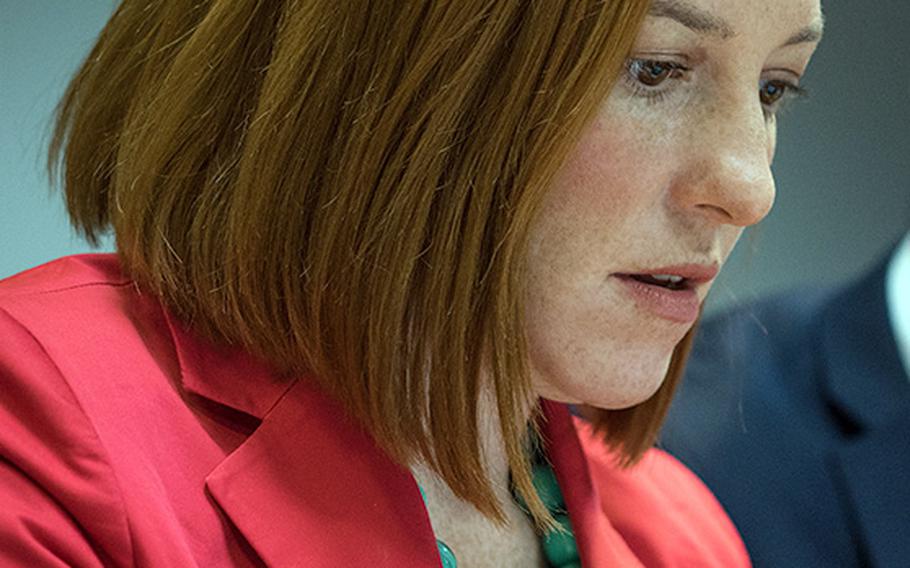Middle East
Taliban, US deny reports of peace talks in Qatar
Stars and Stripes February 19, 2015

State Department spokeswoman Jen Psaki answers questions in Washington, D.C., on April 21, 2014. Psaki said in a statement on Thursday, Feb. 19, 2015, that the United States and the Taliban were not in direct negotiations. (U.S. State Department)
KABUL, Afghanistan — Taliban leaders officially shot down claims from some of their own members on Thursday that they had dispatched a delegation to meet American representatives in Qatar for possible talks to end the insurgents’ fight against the Afghan government.
“The reports regarding the talks with the Americans in Qatar are baseless,” the Taliban said in a statement emailed to media. “We strongly reject these claims. There is no plan for such talks in the Qatar office.”
The State Department also denied that any “direct talks” were taking place.
“We are not in direct talks with the Taliban, and there have not been any direct talks between the U.S. and the Taliban since January 2012, when the Taliban broke them off,” State Department Spokeswoman Jen Psaki said in a statement. “The U.S. is committed to enabling progress on an Afghan-led and Afghan-owned reconciliation process, which can lead to a stable and secure Afghanistan.”
Those statements came after a flurry of media reports on the possible talks quoting unnamed Taliban officials. Earlier on Thursday, Taliban spokesman Zabihullah Mujahid confirmed the possible talks but after the official rebuttal did not explain the reversal.
The sometimes confusing and conflicting reports from within the Taliban itself highlights the challenges of trying to open negotiations with the group, which has many factions.
Earlier Thursday, a senior Taliban leader based in Afghanistan told Stars and Stripes that their representatives had gone to Qatar to discuss peace negotiations with the Americans, nearly two years after the collapse of the last attempt to broker a peace deal.
He stressed at the time that neither the Taliban, who call their political organisation the Islamic Emirate of Afghanistan, nor American officials wanted the news to leak.
The timing is right, he said, for peace talks now that the NATO-led coalition has formally ended its combat mission in Afghanistan. The official spoke on condition of anonymity because he was not authorized to speak publicly.
But the official Taliban statement rejected that view.
“There are no changes in the policy of the Islamic Emirate regarding the talks,” the statement said. “There are still thousands of foreign invaders living in Afghanistan.”
In June 2013, the Taliban, which claims to be the legitimate government of Afghanistan, opened an office in Qatar, a move that was heralded as a step toward peace talks. But the office was closed after only a month when then-Afghan President Hamid Karzai complained that it was an affront to his government.
Separately, The Wall Street Journal reported on Thursday that Afghan government officials also planned to meet with the Taliban at an undetermined location.
Many observers see peace talks as an integral part of any resolution to the conflict, which has shown no signs of abating despite more than a decade of international intervention. But the continuing violence, as well as the long history of conflict between various groups in Afghanistan have undermined efforts to open talks so far.
Despite the declared end to NATO’s combat mission, fighting still continues between government forces, which are supported by foreign troops, and the Taliban.
Twitter:@joshjonsmith